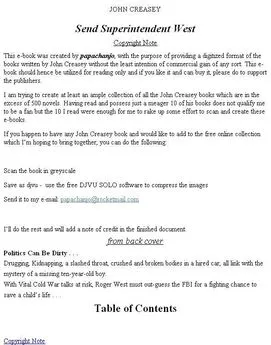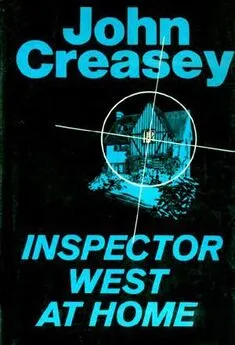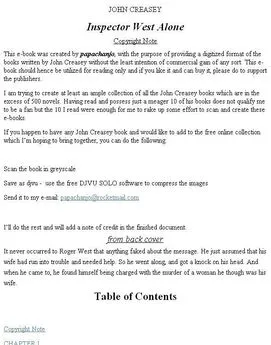John Creasey - Send Superintendent West
- Название:Send Superintendent West
- Автор:
- Жанр:
- Издательство:неизвестно
- Год:неизвестен
- ISBN:нет данных
- Рейтинг:
- Избранное:Добавить в избранное
-
Отзывы:
-
Ваша оценка:
John Creasey - Send Superintendent West краткое содержание
Send Superintendent West - читать онлайн бесплатно полную версию (весь текст целиком)
Интервал:
Закладка:
They turned into Grosvenor Square, and in spite of heavy clouds blowing up, the usual photographers were shooting at the Roosevelt statue. The huge American cars, dwarfing all but a few Rolls-Royces and Hardy’s black Daimler, seemed to gather for shelter beneath the waving flag of the Stars and Stripes.
Hardy had obviously been here before, he was recognized and taken in hand, and they were whisked up to Marino’s office, where Herb, forewarned by telephone, was opening the door for them. He looked absurdly young.
“Come in, gentlemen, Mr Marino’s free right now.” He opened Marino’s door.
Marino didn’t get up, even for the Assistant Commissioner of Scotland Yard. He stretched out his right hand, gripped Roger’s firmly, searched his face and seemed relieved by what he saw. They sat down beneath the portraits of the august dead.
“I would offer you a drink,” Marino said, “but I guess you’ll say it’s too early.”
“Think it’s too early, West?” Hardy asked.
“Not if I’m off duty!”
Hardy grinned, Marino pressed a bell, Herb came in and produced an assortment of bottles. Marino poured out, making a formality of asking Hardy what it would be before he poured a whisky and soda. Herb went away.
“Well, now,” said Marino, “you’re very good to come over at such short notice, Mr Hardy. I surely appreciate that. You’ve been a great help from the beginning. I’m hoping you will be able to help even more.” Roger was glad of the drink, to help him cover his rising excitement “The way it’s turned out, you’re almost the only man we know who could recognize Gissing, Roger. And we want Gissing very badly.” He sipped his drink. “And we think he’s in the United States.”
“So that lets us out,” Roger said.
Marino’s smile showed amiable disagreement. He leaned forward, with one of his rare body movements.
“And we think we can put a finger on him.”
Roger sat up, abruptly. “ Think?”
“We can’t be sure, because we haven’t a photograph, fingerprints or anything else to go by,” Marino said. “And we want him identified so that there can’t be any doubt. We can’t pick the suspect up until we’ve identification — unless he tries to take another powder, we would hold him then. I’m told you’re often assigned to cases overseas, and in this case we certainly need your help, and you want Gissing as much as we do. Can you spare the Superintendent for a week or so, Assistant Commissioner?”
14
SUSPECT
EXCEPT for the perpetual drone of the four jet engines and an occasional lurch when the aircraft dropped through space and then went on as if nothing had happened, Roger would not have known that he was flying. By day, they had looked down fifty thousand feet or so to the Atlantic Ocean, which seemed flat and hardly ruffled. Occasionally they had sighted a ship. England was already three thousand miles away, and New York lay half an hour’s flying time ahead. It was dark in the clouded heavens.
Roger had an empty seat beside him; there were several others in the cabin. Most of the passengers were dozing. Two, who had been air-sick after the first few minutes, were looking wretchedly in front of them. One of the two stewardesses walked from the little kitchen aft, smiled at Roger and disappeared into the crew’s domain. A man snored faintly, a newspaper rustled.
In Roger’s mind was a mixture of looking forward and looking back, and looking back was easier.
Looking back to Janet’s startled exclamation when he had told her, her quick flash of “Not again!” and then her quick “I mustn’t be silly, I’m sorry, darling”, and her bright cheerfulness from then on until he had been ready to go. It was only the previous morning that Marino had said what he wanted.
The stewardess came out, and stopped by Roger.
“Won’t be long now, Mr West, you’ll see better if you move back, the wing is in your way here. There’s an empty seat.”
“Oh, fine. Thanks.” He moved at once.
“It’s wonderful by night,” the girl said.
“Wonderful” was just a word. The lights became brighter, a cloak of diamonds catching the eye and holding it. Flaming rubies and winking emeralds from the neon lighting as they drew nearer, the glitter from the windows of the skyscrapers which lit the sky, dark patches of the East and the Hudson Rivers, the floodlit funnels of the big ships and little ships lying alongside the miles of docks, a fantasy of light and dark, colour and shadow. They seemed unending, as if a moment in time had been caught and held, but the aircraft was losing height, belts were fastened — and then suddenly they were down, taxi-ing along the runway, and the tension which most passengers felt melted in relief. Everyone began to move and talk at once, the stewardesses called out: “Keep your belts fastened for a minute, please.”
He had travelled as Mr Roger West, and hoped that no one knew him as an official from Scotland Yard. He was to be met privately at the airport and taken to the Milton Hotel Marino had arranged everything.
The stewardess who had fussed him while on board shook hands, there was no trouble at Customs, just the unfamiliar accent and a different manner. A porter carried his two suitcases, he carried his briefcase, which had faked business papers — he had become a salesman for British-made cars. He could talk intelligently about cars. He scanned the little crowd waiting in the big, low-ceilinged airport terminal, and a young-looking man in a well-cut suit with broad shoulders, wearing a narrow-brimmed trilby, came up to him.
“Mr West?”
“Yes.”
“It’s good to see you, Mr West. I’m Ed Pullinger of the FBI. I’m told I have to apologize for being Ed.” He had an open smile and an easy manner, his accent seemed strong to Roger, and he spoke more slowly than most men at home. “I hope you had a good flight.”
“First-class,” said Roger.
“I’m very glad to hear it.” Ed led the way, and the porter followed. Outside, lights glistened on a vast mass of cars across the tarmac road; one car was drawn up by the exit. “This is my car,” said Ed Pullinger, waving his hand towards a low-slung, gleaming giant of a Chrysler. “Put those grips in the back,” he said to the porter, and tipped the man. “Why don’t you get in, Mr West.”
Roger started to get in, banged against the wheel
“We drive on the wrong side,” Pullinger said. “I should have warned you.”
Roger laughed and sat in pillowed comfort as Pullinger drove off. The car moved smoothly on its automatic gears. They swept along a nearly deserted road.
“The parkway,” Pullinger said. Traffic was all one way, and travelled fast — fast compared with London city traffic “We go over the Queensborough Bridge,” he continued. “If it’s your first visit, that’s as good a way as any. Have you been here before?”
“Once — five years ago.”
“You’ve plenty new to see,” said Pullinger. He turned off, and they followed a twisting road for a mile or so, then turned again into a road which was divided into three — two carriageways with a wide gap between. Soon, they were going through a brightly lit section; advertisement signs which dwarfed London’s had a novelty which fascinated. They blinked, flashed, changed colour; they never stopped moving. “This is Queens,” Pullinger said. “Wait until you get to the bridge. Does Tony Marino still use his wheelchair?”
Roger’s head jerked round.
“ What? ”
“Didn’t you know?” Pullinger looked surprised, almost guilty. He’s sensitive about it, I guess, although you wouldn’t know it He lost both legs during the war. Had a special wheelchair made. When he was here he used to sit at his desk and never move, looking at him you wouldn’t guess.”
“I didn’t realize why he never got up,” Roger said heavily.
Pullinger laughed.
“That would give Tony a big kick. A great guy, Tony Marino. Remind me to show you the letter I’ve got from him.” They were moving quickly past what seemed to be an endless stream of green lights at every intersection; the lights stretched out a long way ahead. “Now we won’t be long,” Pullinger said.
They reached the long approach to the Queensborough Bridge, with its cobbled surface; turned corners; and were suddenly on the bridge itself, tyres humming oddly on the metalled surface. Ahead, the lights of the skyline stood out against the pitch-black sky. From above, they had seemed brilliant; here they scintillated. They didn’t seem real
Pullinger kept up a running commentary.
“The one with the red vertical line at the top is the Empire State Building, that top part’s used for television transmitting. There’s the Chrysler Building.” They were jewelled swords, blades pointing skywards; thousands of windows and thousands of bright lights. “It’s some city,” Pullinger said. “It’s the finest city in the world.” He glanced sideways, expecting a challenge.
“I’ll argue when I get to know it better,” said Roger. “Just now, I’m trying to remember everything.”
He found himself thinking of the reason for Marino sitting in the same place and seldom moving his body. Nothing else about the man had suggested he had been so crippled.
“Fifty-seventh Street,” said Pullinger. “One for shops.” He named the avenues they passed. The lights seemed brighter than in Queens, traffic was thick, huge yellow, red and blue taxis crowded the streets. “Broadway,” said Pullinger. “I’ll drive you to Times Square, and then you can go and recover at your hotel You don’t have to work tonight.” He turned left, there was no change in the street scene until they turned a bend in the road, and ahead of them light seemed to blaze from the ground and from the sky. “More lights in that square mile than any other place in the world,” said Pullinger.
“It looks it,” Roger said faintly. He laughed. “And it’s real.”
“You’ll learn how real. The Milton’s on 44th Street, only a step from Times Square, Tony said to put you in the heart of things. Say, Mr West, would you like to have dinner with me? The hotel food is pretty good, I guess, but if you’re not too tired, we could go down to the Village, or any place you like.
The Village sounds fine! I’ll wash and freshen up.”
“I’ll see you to your room and then leave you for an hour,” said Pullinger. “Give you time to get an appetite. You’ll need one.” He had all the brightness and frankness of Herb, Dr Fischer, and the others at the Embassy. “It’s not a big hotel, but it’s good.”
The Milton Hotel had an unexpectedly old-fashioned look, and the foyer was half empty. Roger signed a slip of paper, not a book; a bell-hop, looking too small for the two big suitcases, took them up to the ninth floor; Room 901. Pullinger ordered drinks, right away. The room was on a corner, with windows in two walls. Lights flashed on and off from nearby signs; a police siren shrilled out down below, a car blared and went on blaring.
“Don’t let me forget that letter,” Pullinger said, and took out a billfold not unlike Ed Scammel’s but made of alligator skin. He handed Roger a letter. It was on the Embassy note-paper, signed by Marino, and ran:
“Dear Roger,
Ed Pullinger, the bearer of this letter, will do right by you.
Tell me if he doesn’t. Don’t exhaust yourself looking at Gissing, there will be plenty to see.”
The drinks arrived, Roger’s a straight whisky and soda, Pullinger’s a small glass of Bourbon and a tall glass with three ice cubes in it. He poured the Bourbon, and Roger watched it cascade down the ice cubes.
Читать дальшеИнтервал:
Закладка:










